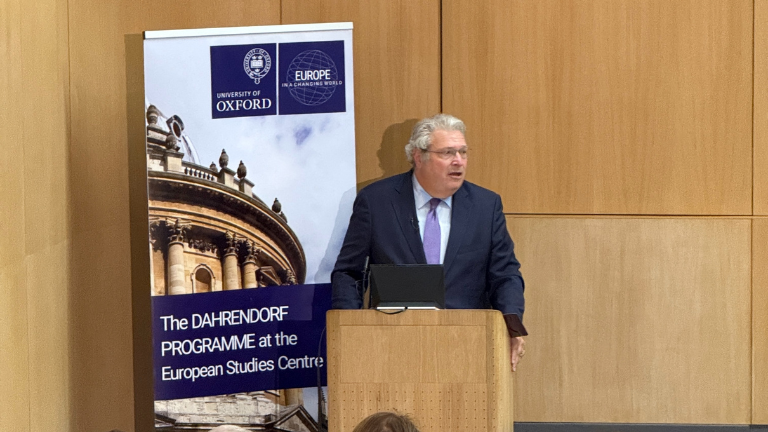United Kingdom
Europe is the only defender of the liberal world order

Robert Kagan at Dahrendorf Lecture
© Dahrendorf Lecture and ColloquiumRalf Dahrendorf, one of the central figures of modern-day liberalism, saw politics as a framework for imperfect people to live in freedom. Just a few months into the second Trump presidency, this notion may seem more challenging—but also more essential—than ever. The American role as leader of the free world has in many ways expired. Europe must urgently take on and secure new responsibility if it wants to fight for the liberal world order. To answer how, the American foreign policy expert and author Dr Robert Kagan was invited to present this year’s Dahrendorf Lecture at St. Antony’s College in Oxford.
Tracing the roots of American hegemony in the liberal world order
Dr Robert Kagan offered a timely analysis, blending historical analysis with contemporary insights. He referred to the liberal order as the “American order,” highlighting the United States’ immense influence which still has long been underestimated. Now, as that order faces mounting threats, Kagan suggests that “our appreciation of the American order might grow as it disappears.” Hence, understanding its origins is critical.
Kagan examined why the United States’ dominance after World War II went largely unchallenged. He argued that the U.S. was never truly loved, but it was consistently supported and its hegemony legitimised—not due to the brilliance of its foreign policy or military actions, but because of its attitude and the reactions of other countries.
Firstly, the U.S. had no territorial ambitions; its involvement in the world wars was framed as a defence of liberalism, not conquest. This led to a reactive rather than aggressive posture, making its power more palatable. Secondly, it was in the interest of many countries—especially economically—to align with the U.S. Thirdly, the American model of liberal leadership was built on cooperative, democratic partnerships. This multifaceted foundation allowed U.S. hegemony to expand, while leaving others—particularly Europe—dependent and vulnerable.
After the Cold War, the origins of the liberal order were largely forgotten. A belief emerged that human progress would naturally lead toward liberalism, and international institutions could take over the U.S. role. But this was, according to Kagan, a dual delusion: Europeans thought the U.S. was no longer necessary, and Americans agreed. While the fear of communism once kept the U.S. engaged, that fear vanished with the Cold War’s end—and public scepticism about defending liberalism became more pronounced.
American antiliberalism and the European burden
Kagan’s second focus was ideology. He argued that the U.S. has always been caught in a struggle between liberalism and antiliberalism, exemplified by the abolition of slavery and the civil rights movement. The 1920s offer a stark comparison: the Ku Klux Klan’s broad acceptance, xenophobic immigration laws, and protectionism mirror current trends. But today, the situation is arguably worse. In the 1920s, the U.S. was largely indifferent to Europe’s fate; now, it has become an “antiliberal superpower,” as Kagan put it. He cited the MAGA movement and recent instances of U.S. interference in German elections as evidence.
Where does this leave Europe? Kagan painted a grim picture: Europe now faces not only Russia as an antiliberal power, but also the United States. By withdrawing its security guarantees, the U.S. has effectively abandoned the liberal order in favour of a multipolar one. While the consequences remain uncertain, one thing is clear: security must now be self-provided. Kagan’s stark conclusion: “Rearm Europe. The liberal order depends on it.”
How Europe can defend liberalism
Kagan’s lecture drew a full house and sparked a lively debate, focusing on a key question: if Europe is now the last bastion of liberalism, how should it defend the liberal world order in a multipolar world?
This question carried over into the following questions and discussions among participants, most notably the role of China. While Kagan characterised China as cautious and less overtly antiliberal, others argued that China, too, must be seen as a clear threat alongside Russia and Trump’s America. Only then, they suggested, could Europe fully define its role in defending liberalism.
Another focal point was support for liberal forces in the United States and elsewhere. When asked what confident European leaders could do, Kagan urged them to speak out against troubling developments in the U.S. He criticised the tendency of some European leaders to ingratiate themselves with President Trump, and called for stronger liberal advocacy.
Prof. Dr Karl-Heinz Paqué, Chairman of the Board of the Friedrich Naumann Foundation for Freedom, offered a more optimistic view. He argued that the liberal order is not yet lost and that Europe has many tools at its disposal: “Trump alone will not make globalisation go away.” He pointed to promising developments such as a potential Mercosur agreement and significant changes in European security policy, including Germany’s Zeitenwende and Finland and Sweden joining NATO. For Paqué, the key is mindset: “The mindset is the most important factor when reacting to a changing world order.”
Ralf Dahrendorf viewed liberalism as a process of continuous questioning and debate. The input by Dr Rober Kagan and the following discussions for sure offer a variety of perspectives on the roles of the United States and Europe in a multipolar world. However, one message was clear: Europe cannot afford to passively watch the liberal world order collapse. It must rearm, act with confidence, and adopt the right mindset to defend the values it cherishes.
The Dahrendorf Lecture 2025
Every year, the Dahrendorf Programme at the European Studies Centre of St Antony’s College, Oxford, hosts a lecture in memory of its namesake, liberal politician and sociologist Ralf Dahrendorf. The Stiftung Mercator and the Friedrich Naumann Foundation for Freedom co-organise the event. On 2 May 2025, the Dahrendorf Lecture, titled “Alone in a Trumpian World: The EU and Global Public Opinion after the US Election,” was delivered by American foreign policy expert and author Dr Robert Kagan.
